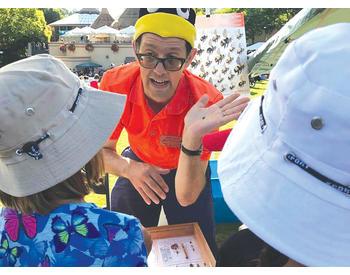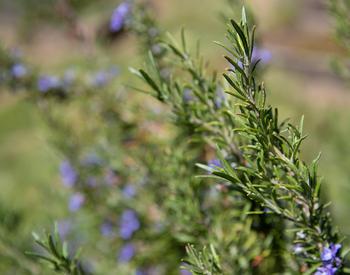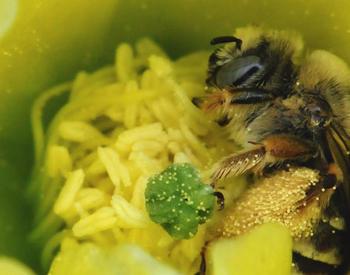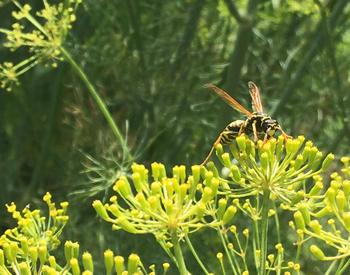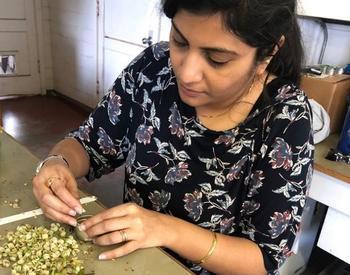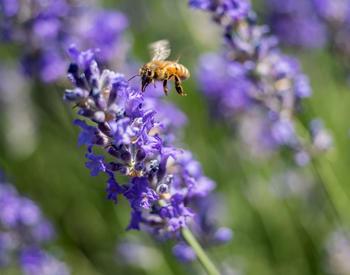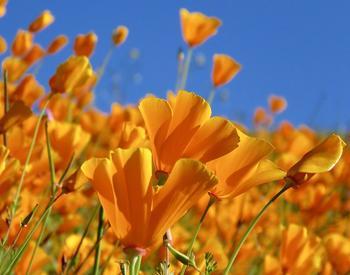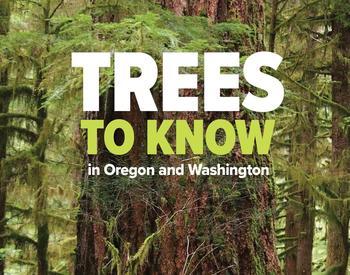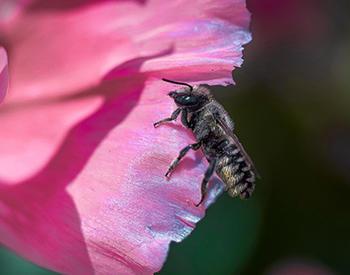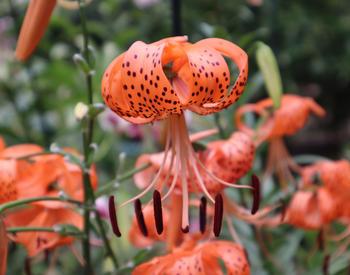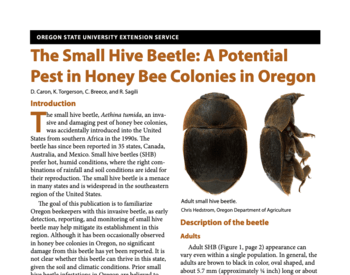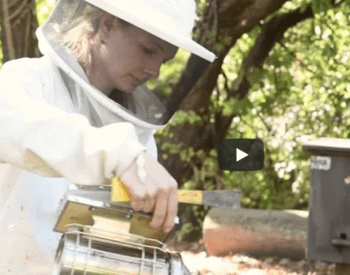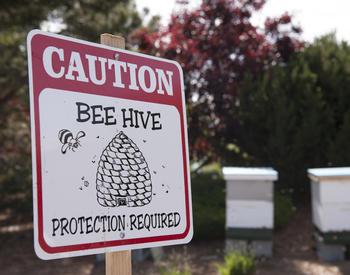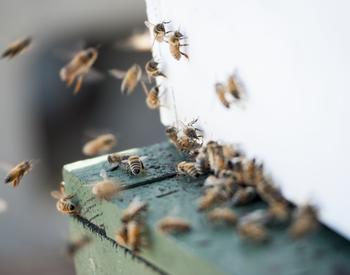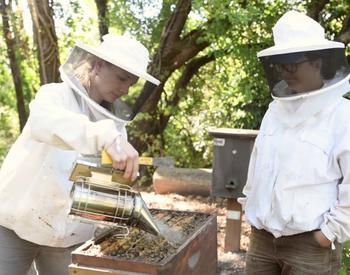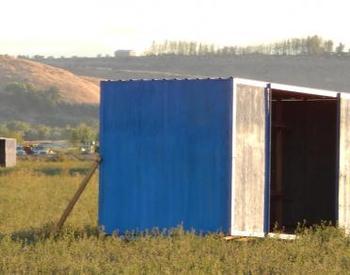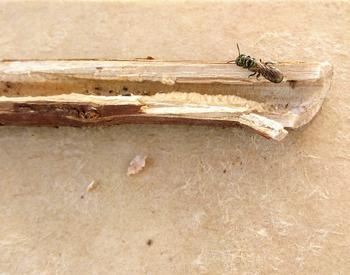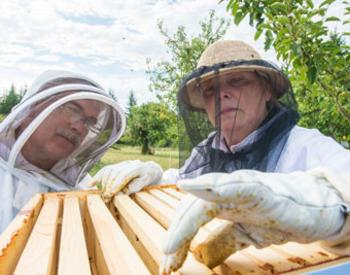Transcript
[00:00:00] Andony Melathopoulos: A hundred years ago, beekeepers and Oregon decided to form an association. What became known as the Oregon state beekeepers association and a prominent feature of the association. The association does a lot of different things, but they host an annual conference where you get to hear the latest and greatest of what's going on with beekeeping and, uh, in the state, outside the state.
[00:00:22] But if relevance to the state now last year, many of you probably attended the. Uh, conference, it was entirely online and it was a great conference, but it lacked that kind of like getting together and talking with different beekeepers sharing experiences, learning about what people are experimenting with this year.
[00:00:39] From October 22nd to the 24th, uh, just a couple of weeks away. They're gonna, the OSBA is going to run. It's a hundredth anniversary conference, both, uh, online. Well, there's going to be an in-person component in Florence, Oregon. I am going down as well as many of the beekeepers in the state to learn more about the conference.
[00:01:01] Uh, I talked to the mastermind of the program, Joe Morasch. Now Joe, many of you know is a beekeeper. Um, he's prominent in the Portland Metro beekeepers, uh, club, but also he's a. Um, the vice president of OSBA, he's been managing the program for the last couple of years. He's done a terrific job and this year is no exception.
[00:01:23] I love this episode because we kind of go through each of the, uh, elements of the conference and we just kind of like talk about its relevance to Oregon. It's a great conversation. Uh, hope you enjoy it. And I check the, uh, I just want to point out that the early registration ends October 8th, shortly after their show drops.
[00:01:42] So make sure to register. And without further ado, here's Joe, Morasch talking about this year's hundredth, Oregon state beekeeper association conference.
[00:02:01] All right, well, welcome to pollination, Joe.
[00:02:04] Joe Maresh: Thank you for having me. And I'm glad to be here. And I'm flattered that you have invited me.
[00:02:11] Andony Melathopoulos: Well, I am so excited because. It's been a long COVID pandemic and the OSBA conference is coming up. You're organizing it again. You organize it through the pandemic. And now we are headed to a hybrid conference and it's not only a hybrid conference, but it's the hundredth anniversary of the Oregon state beekeepers association.
[00:02:35] So to start with tell us the details. When is the OSB conference? How can people participate and then we'll get into what's going, gonna what's happening?
[00:02:45] Joe Maresh: Okay. Well, our conference will start on October 22nd and run through the 24th. Uh, and it's in, uh, Florence, Oregon, and, uh, Register, you can go online to our website and you can look over the whole, everything about the conferences on the website.
[00:03:11] Um, you can look things over, you can, you'll be able to see, uh, who the speakers are. There's pictures of them. That's what they're going to be speaking on and all that, um, This has been difficult this year, because this is our hundredth anniversary. And as you know, COVID has been raging, uh, it's kind of dropping off now and what we're kind of hoping that it will really rapidly decline, but if people are not comfortable meeting in person, then.
[00:03:51] Um, we have an option that they can just do it all online, um, via zoom and, uh, you know, it's really important for the health of the organization that we. Have a conflict and we don't want to have a conference where people are worried about their health. We w I do not blame people if they do not want to attend in person.
[00:04:17] I understand that, um, many of my friends will be online, but there are a lot of people that really want us to have, have an in-person. I think we can do it in person. Um, it's, uh, important that we do. Take precautions. Um, we're going to abide by the state mandates. Um, in other words, you have to have a mask indoors and, uh, we will also be, uh, the facility has the ability to take your temperature as you enter.
[00:04:53] And so we'll be doing that also, but, um, this conference. Well, you know, basically what's going on up, uh, Friday is, you know, setting up, but there will be George Hanson has a workshop of and caustic painting. Oh, wow. Yeah. And if you've ever seen his artwork, it's amazing. And. Is plenty of opportunity for people still at this point, even though registration has been open for awhile, there are still a few spots left.
[00:05:31] I would encourage you though, to register very soon for that. There is a fee extra fee and it's $20 and it's just.
[00:05:41] Andony Melathopoulos: Yeah, that's
[00:05:42] Joe Maresh: it. That is
[00:05:44] Andony Melathopoulos: the material. If any of you have followed George on Instagram or no, George, I mean his income, he he's like a prolific. He, I mean, he's like, everybody knows him nationally.
[00:05:54] He's been on every committee and, but he does this, um, it's kind of like painting with beeswax and he has gotten really. And I I've seen him. There was a short video last year showing, and it's a technique that anybody can pick up. Like encaustic is something that you could do at home with some bees wax, a small studio.
[00:06:14] I'm excited about that, that I I'm signing up. I'm going to go do some. I got.
[00:06:23] Joe Maresh: I I'm, I'm struggling on whether or not to sign up for that or not, because I'll be really busy.
[00:06:31] Andony Melathopoulos: You can't, you're the only person who can sign up cause you're going to be organizing everything. Yeah.
[00:06:37] Joe Maresh: But yeah. And when you see this painting, uh, uh, and how he does it, he, he makes it look easy, but. And it's very interesting and I really encourage people to take advantage of this.
[00:06:55] And I think you can actually view the video somewhere on our, uh, on the OSB website. So,
[00:07:03] Andony Melathopoulos: okay. So this is Friday and I remember there's typically kind of like a PR uh, commercial beekeeper sessions as well. What's going on? Is that, is that, what, what, tell us about Friday.
[00:07:14] Joe Maresh: Okay. And then Friday, uh, also there will be a B school in the afternoon, starting at one o'clock.
[00:07:20] There will not be a commercial beet or a master bee keeping program this year. It will be done online. And so, um, I don't have control over those things and, um, it's the pandemic and. You know, I think that some folks felt uncomfortable and I don't blame them, um, uh, for having more of a program. So, but, uh, and then in the evening, There is a meet and greet.
[00:07:56] In other words, you know, we all get together and we have like a cheese and wine, social, you know, beer and wine. Um, and we get, you know, get to meet each other before the conference. And, um, it's light food. It's not meant to be a dinner, although some people make that, but, um, Anyway, when we do do that, a cheese wine, social.
[00:08:23] So, um, and we were going to have music, but at the last moment, uh, our guy, Kenny cross, um, for, uh, some personal reasons I had to cancel. So. Uh, we all feel, be able to entertain ourselves. Um, and it's a lot of fun, the meet and greet. Okay.
[00:08:47] Andony Melathopoulos: So, but, but also just, just going over the program on Friday one to four beekeeping basics.
[00:08:52] So do we, Karen is gonna, uh, if you're, if you're just starting with beekeeping, this is a great first event to go to. You'll be able to, uh, kind of work through the basics before we kick off the main program, which kind of is, uh, is it has all sorts of other things.
[00:09:10] Joe Maresh: Yeah. And also this is, um, there's no fee for this.
[00:09:17] Um, but it is limited to, I think we said 40. You know, there's still room. Uh, it is filling up and, um, but, uh, there's definitely. And if we go over 40, I don't think knew he's going to have a problem with it, but we would like you to pre-register for that. Okay.
[00:09:41] Andony Melathopoulos: Okay. Okay. So that takes us, we've got a nice, uh, wine and cheese social.
[00:09:45] I'm going to be there. I'm going to be hanging out. I'm looking forward to seeing everybody in person after a long time away. And then we start. Right away Saturday. We've got some great, um, great speakers. Uh, tell us a little bit about, um, some of the man I'm just looking at the program right now. This is so amazing.
[00:10:04] You've got everything.
[00:10:06] Joe Maresh: We don't hear everybody, but we do have a good line of speakers we're going to have, and this is a fellow that I I've heard a lot about. And I know that you've probably been to his presentation, but he does some really interesting research. Um, and his name is Samuel Ramsey, and he's going to be talking about for all of mites and.
[00:10:30] And, you know, current research and that'll be a very interesting talk. Um, we kind of. I kind of, when I designed the program, I, Ty tried to have like one speaker compliment the next week. And then after Samuel Ramsey, we'll have Jennifer Berry and she's going to be talking about something that's controversial.
[00:10:54] Go
[00:10:54] Andony Melathopoulos: ahead. I'm glad I remember Jennifer, uh, Barry coming to, uh, one of our previous conferences and she is. Great. She's a great communicator and she, okay, great. So I'm glad she's coming back. I'm excited to see Jennifer Berry on the program, but keep going.
[00:11:12] Joe Maresh: Yeah. So Jennifer Berry is, she's a real go getter.
[00:11:16] She really involved and what's, you know, kind of neat about her is that she has. Uh, sense of humor. Yeah, I was told, and I won't mention who told me, but that she used to do stand up comedy.
[00:11:35] Andony Melathopoulos: It's true. She used to be before she got into bees or before she took the position at university of Georgia, she is a standup comedian.
[00:11:41] She is. She can hold a room.
[00:11:46] Joe Maresh: She does. And she's very good, but she's going to be talking about, um, their research, uh, on, uh, uh, uh, uh, with oxalic acid and the effects of the testing that they did and, uh, their whole program. And I think they came up with some interesting results that are not. You know that, uh, some people on the west coast have had different results, but it'll be interesting to hear her POC on that.
[00:12:23] Um, it's probably controversial, but I, I don't know. I think that we need to hear about all sides of these things. Then we're going to take a break after her talk and. Uh, when we'll have, uh, George Hanson is going to give us a talk on, be researched that you can use that. And this is stuff that is being done through project Amos, um, in the OSTA.
[00:12:57] Many organizations fund a project aid to Sam project a to Sam is probably the largest non-governmental. Uh, funding for pollinators. They do a lot of stuff. Um, and George is going to be talking about this and he just spoke at the Portland Metro group and he gave a very interesting talk about queen research going on, but they do, they fund a lot of stuff.
[00:13:25] Andony Melathopoulos: We've got all that queen stuff. And George has always at the middle of everything. He's sort of. On a lot of different, so he kind of gives a good overview of what's. It's a great, I remember he always gives this update and it's great because you kind of get a sense of what's up and coming. Like it allows you to stand back and in Georgia, like his project ASM does, we've had them on the show previously.
[00:13:47] Danielle Downey. No, it's somebody else on the show from project. It was Danielle, but anyways, we get, we have, you can just see what's on the horizon. It's a great talk. And it's kind of like, it gives you in a like quick little snippet. What's uh what's uh, what's coming.
[00:14:03] Joe Maresh: Yeah. um, George does a real good job of that.
[00:14:08] And then after George, we're going to have, um, um, Elma Lee Carlson and she's um, she's going to talk about pesticide risks. She's been working on she's more Oregon state and she's a grad student and she's, I think working on her PhD and, um, she's does a really good talk. She's really engaging. Um, and then when we break for lunch, we will have feed shepherd.
[00:14:41] Will we talk speaking? Yes. And this year, um, he's been a little late getting his stuff to us, but we'll, he's going to be talking about is the reintroduce deduction of Caucasian Queens into the north America. And he, you know, I don't know if people understand that there's a whole bunch of queen research going on at WSU and they're on the forefront of that.
[00:15:18] And they've been bringing in, uh, Biological materials such as a drone, semen, and artificially inseminating Queens to bring some of this, uh, uh, the bio diversity back into our stocks. And so I'm really interested in this because I've been buying, uh, Caucasian Queens lately, not there they're expensive.
[00:15:47] They're more expensive that my sources, John Jacob, out of old soul, which is out of rogue river, um, they're more expensive Queens, but they have traits that I think would be good for this area. Uh, the, the can to make more propolis, which is cutting meat and, uh, uh, Some people don't wipe that. I actually think it's a good quality in Queens, um, or bees.
[00:16:17] And then, um, they winter over better and they seem to have more resistance to things like might, but,
[00:16:26] Andony Melathopoulos: well, who knows? The thing I love about Dr. Shepherd's talks is kind of like a travel log. Yeah. I mean, he's just, uh, you know, he really he's traveled the world, looking for bees is always entertaining. Cause he goes to these like remote places in the caucuses and then, you know, we'll find these populations.
[00:16:47] So it's really, it's always a fun talk cause he's just really entertaining, but it's also, he's been everywhere and he knows the kind of biogeography. You know, the Western honeybees really well. So it's always wonderful. And I, I do think the other thing is it's been, you know, w when people, like, when I think about the new world Carney Olan project, or some of these other projects, trying to rescue some old genetics, the populations haven't really seen any new germplasms since the 1920s.
[00:17:19] And so this is really exciting because this is brand new, you know, when people try to do Caucasian. They're kind of using dribs and drabs of things, but this is like pure stuff coming in. This is exciting. So I'm, I'm, I'm going to be there in the front row.
[00:17:36] Joe Maresh: Yeah.
[00:17:40] You know, uh, if you've never heard of Dr. Shepherd's feed before, he's very entertaining. Uh, and so anyway, and then after lunch, we're gonna have, uh, Dr. , um, this is on Saturday. Uh, he, he's going to give us some research updates from Oregon state university, and he's going to talk about their boroughs. Uh, research there, um, there be nutrition, uh, impact of wildfires and quite a bit more.
[00:18:12] And, you know, I don't know that people quite fathom what happened last year with our bees. Some of us like myself, keep bees up in the mountains later on in the year. And I know that, uh, uh, that was a very trying season. I did not lose my bees to fire, but, um, Some people did, and it's real interesting what they found out.
[00:18:42] So, um, and you know, they did some, uh, overall research that I think is kind of real interesting. Uh, they did it some real good sampling research, um, and, uh, a friend of mine, Paul Stromberg was part of that, uh, through the, uh, uh, master beekeeping program. And. I find it very interesting. So this will be an interesting talk remission.
[00:19:08] If I always, you know, go out of my way to hear remittance talks because of the very informative
[00:19:15] Andony Melathopoulos: well, and I know he's got new stuff like this summer, I've been poking around the AICPA culture lab and they have some brand new, excellent research to be nutrition work that they're just doing right now. Um, you know, Plastic be nutrition at that lab has always been a world leader in, uh, B nutrition, but there's some new work that's coming out.
[00:19:34] So, um, it's a first glimpse at some brand new research, which I think is going to help us. You know, when I think about being nutrition, Joe, I, I think about. You know, this year was a tough year in Oregon. It was so dry and, you know, the seasons shut off. And we had a couple months there where we had to keep bees moving.
[00:19:54] And I think his new work is really going to focus on this question of like this all problem, like what's happening between being nutrition, winter bees, uh, getting your colonies to keep moving when it, like everything goes brown, which. Ah, this is a hard year for bees in
[00:20:14] Joe Maresh: the, it is a hard year for bees and is another thing that, uh, And then the next speaker that we're going to have after Dr.
[00:20:24] is going to be Juliana wrangled from Texas a and M. Uh, she's great. Um, and she's going to be talking about, uh, nutrition and the ecology of the honeybee in a changing landscape. That's her, that's her talk. And so that'll be a real interesting talk that she gets and, you know, The landscape that's important that people understand that things are changing, um, you know, the fires, uh, drought and just, you know, the climate is what it is and you, you can't change it.
[00:21:04] So we have to react to it. And this will be very interesting. And then, you know, we'll have. Marjorie Erie is going to, um, give us a talk about, you know, uh, you know, honey judging in, in marketing or, uh, your honey and, uh, then we'll have our general membership. Oh,
[00:21:27] Andony Melathopoulos: not so. I mean, I think it's a, it, it's a kind of a lost art, especially, you know, w we had the fair this year, finally, with a fair Oregon state fair came back and judging honey is a big thing.
[00:21:39] But I do think that people, you know, don't know about the wonderful honey. We have an Oregon. Metaphor and I, it was talking to you. I actually bought from you. It don't forget. I'm buying some fireweed honey from you. We have some honey in Oregon. That's really unique to this area. It's great, honey. That we haven't yet.
[00:22:00] Joe Maresh: Oh, yeah. And which really is interesting because it's all over the seat. If you're really trying to get a big variety of honey, we have, you know, it's not just, you know, I love fireweed, honey.
[00:22:18] You know, it's a different type of honey, but for me, I'm not real fond of it, but, you know, And some people will say help you. How can you eat this stuff? But I love buckwheat, honey.
[00:22:38] I do. I like the buckwheat honey. It's it's uh, you know, uh, I like Blackberry, honey. It's we have. Oh, honey, you know, there's snow barriers, fireweed there's re uh, rabbit brush, honey. Uh, there's all kinds
[00:22:55] Andony Melathopoulos: of, you've got a great state for, you know, for diversity. I have to say buckwheat is kind of like the Guinness beer of honeys.
[00:23:01] It's kind of, you know, yeah. Okay. But fireweed is, is, is I'd love a water white or weed. I remember someone saying you can really tell if it's real fireweed. If you can read the newspaper through.
[00:23:18] Joe Maresh: Yeah. And it is really interesting because fireweed honey is, you know, it's like the first year I took me up in the mountains, four or five weeks. I was just amazed at how light it is.
[00:23:33] Andony Melathopoulos: Um, and it never granulates nail never granted.
[00:23:38] Joe Maresh: I D I have kept some fireweed, honey, and it's, this is its third season and it's in a jug and it still is it darkened slightly, but it is still very, very light and it did
[00:23:51] Andony Melathopoulos: not grant.
[00:23:53] Okay. 4:00 PM. I'm going to be there. I want to learn about these wonderful honeys. Then we've got the banquet oh, general member
[00:24:02] Joe Maresh: meeting. So I'll let you talk about.
[00:24:06] Andony Melathopoulos: Well, here's what I'm going to talk about. So thank you. I was so excited and honored to be the banquet speaker. But what I was going to talk about is I am a honeybee person.
[00:24:15] I come from an AICPA culture background, and I've had to make the transition to learning Mella tology and native bees. So this is going to be a talk it's going to be fun. There'll be lots of pictures, flowers. Be faces like staring you in the face of that transition for me of like becoming and some of the things I've learned, because I think the thing is that people forget is people who are doing honeybees are so well suited to general cause we know all the body parts, uh, although honeybees are a little bit odd and being, you know, big colonies, we are in a great position to learn about native bees.
[00:24:52] And so this is going to be a talk that shows you how I did it. And so you can do it. But then we'll, after that we've got the, we've got the silent auction. Well, the silent auction is going to end and it's going to be online
[00:25:03] Joe Maresh: this year. There there'll be the online auction. Um, but then there will also be an oral auction.
[00:25:11] It won't, it won't be the size that it was in the past. People said, oh, that auction is brought on. And some people really liked
[00:25:18] Andony Melathopoulos: the auction. I really liked.
[00:25:21] Joe Maresh: Yes. And you are going to be one of our auctioneers.
[00:25:26] Andony Melathopoulos: I'm watching YouTube videos on how to sell auction cattle. So I'm working on it.
[00:25:33] Joe Maresh: We're going to try to do is try to wrestle feed shepherd
[00:25:36] Andony Melathopoulos: industry.
[00:25:37] Steve is the best. Okay, great.
[00:25:40] Joe Maresh: Yeah. So anyway, but we will have the auction and there be some really neat stuff. It'll be in the auction and, uh, I don't know all of what there will be at the oral auction, but there is a silent auction in the oral auction. And it's really important that people participate in the auction because what just remember this, all the money that we raise in our.
[00:26:09] Goes for research. Okay. It goes for honeybee research. You might go for, you know, it doesn't all go to Oregon state. So we give some doorway, uh, Amos, M uh, project need December. We give it, um, sometimes we give it to other, uh, you know, uh, universities, uh, We, especially when they're doing things that we want to see funded.
[00:26:33] And so this is really important. This is a, this is how beekeepers can be invested in research is, and the auction is. We need to raise money for research, you know?
[00:26:48] Andony Melathopoulos: Um, no, absolutely. The honeybee lab at OSU does, uh, does a lot for Oregon beekeepers and everybody knows this cause you sort of, you'll see Carolyn breeze show up at your beekeeping club, but then you'll see this research that comes out.
[00:27:03] And these recommendations, I remember a couple years ago, every year, they're sort of like, you know, a Varroa warning Ramesh will put out and he sort of like, he, it's kind of like this. This is a great service back to the industry and it's, and it's always great to see the generosity of, you know, large commercial beekeepers who see the value of this and, you know, the bidding war over, you know, um, some, you know, California queen from pat hykeham, it's just like driven up through the wall.
[00:27:30] It's, it's always exciting. It's a chance to, it's fun. We're all there together and, um, bidding things up. And, um, I always say. The auction. I just love watching everybody support the B program at OSU. It's wonderful and, and WSU and some of the other, uh, recipients of the research money, but it up guys let's go, I'm going to be there.
[00:27:52] And I always do it too. I always like, um, there's certain things that. Want to cut my eyes on him, George Hanson and caustic painting. Okay. Yeah, I did
[00:28:02] Joe Maresh: last year at the auction, it was the silent auction. And you know, I encourage you to watch that video of George Hansen, uh, doing his encaustic painting because that painting of the, the beehive in the fire.
[00:28:19] Oh, I got that at the auction. I really cherish that. So.
[00:28:24] Andony Melathopoulos: All right, so let's, let's take a quick break now. That's gonna take us. I'm I'm I'm now on Saturday's ended. I feel full of AP culture. I go to bed in Florence and then I'm going to wake up the next morning and that's where we'll start off after this quick break.
[00:28:40] Okay. It's Sunday morning. I'm up. I'm in Florence. And by the way, Florence is just the wonderful place. I mean, everybody in Oregon probably knows where Florence is, but it's just this it's on the ocean. It's beautiful. And so I'm going to hear seagulls first thing in the morning as I wake up my cup of coffee, I'm going to go over to the auditorium and we're going to start up again.
[00:29:01] And we have Jennifer Berry joining us.
[00:29:04] Joe Maresh: That's correct? Yes. We have Jennifer Berry and she's going to be talking about something that is very near and dear, to me, she's going to be talking about weeds and beads and you know, this, you know, Jennifer Berry of hits it here. You know, it's like we look at, you know, I look at weeds as being a source of.
[00:29:30] Uh, food for pollinators. And she's going to talk about that. And, you know, I think it's really important that people understand we need habitat, not just for our bees, but when we put habitat out for our bees, we're doing it for native pollinators too. They're very compatible. And
[00:29:51] Andony Melathopoulos: I often think about this.
[00:29:52] I, you know, blackberries, Himalayan, blackberries. You know, people all all know it's the major honey crop in, in Western Oregon, but you know, the diversity of bees that you will see in there. And in addition, because it's a pithy stem, you have, you know, Sarah, Tyna the small carpenter bee nesting, and all those canes.
[00:30:11] It's like a huge, you know, as a weed and it's a real problem, but it also has these additional benefits that can't be overlooked.
[00:30:22] Joe Maresh: Pretty amazing. You know, it's like think of this queen Anne's lace, that's basically a wild carrot and the carrot farmers hate, but late in the summer, you know, That's the only thing and you know, what they make honey from. They use it, the bees use it. It's amazing. And it's not just her, but anyway, she'll be talking about those things.
[00:30:50] And then after. We have Jennifer Berry, we're going to have somebody. This is a really curious, I've never heard her speak before. She
[00:31:00] Andony Melathopoulos: is amazing. She is amazing. Keep going.
[00:31:03] Joe Maresh: Amy Bartow from national, uh, NRCS. Okay. And that's part of the USDA and they're partly, you know, the, the nationalist us, uh, re uh, soil conservation service.
[00:31:18] She, you know, I've talked to her on the phone and I'm really excited because I am a beneficiary of some of their programs. So she's going to be talking about, you know, things that you can do on an irrigated land to have, you know, for beef in the season when nothing else is around. I'm really excited about that.
[00:31:48] And then she's going to tell us how, you know, she's going to give us, you know, um, a talk on, you know, how you can fund things or, you know, how you can do these things. And they have funding, they have programs. It's amazing what they can do. And most of us don't know about these things. And it's important that if you're into pollinator habitat, Which we all should be.
[00:32:17] There are tools that they have, you know, if you're in Clackamas county that you they'll rent you a Seadrill, they have all kinds of programs. Uh, you can possibly get. No money for doing a planting. Um, there's lots of programs that
[00:32:37] Andony Melathopoulos: well, I, and I there's lots of programs that they run, but Amy specifically, so the one thing I love I've, I've walked, you know, heteros with Amy.
[00:32:47] Amy works at the plant material center. And so, which is in Corvallis where she trials all the plants. She knows how to grow. Everything. She's grown it for seed. She's grown it out. She knows the equipment. She's the kind of person that NRCS field agent will call. And they say, Joe Koresh has called me up and he wants to grow this exotic, this, this, you know, this native vetch.
[00:33:14] How do I do it? Amy's grown it. So the great thing about this talk, she's done all sorts of plots. I remember there was some plots out in Corvallis where she tried seed mixes. From various companies and she showed that they're out of balance. A lot of them have way too many California poppy or Lupin. And, and in a couple of years, that's all you got.
[00:33:33] So she's kind of worked out the kinks of things. I'm so excited that she's coming because she really knows the nitty-gritty how to do things. Don't.
[00:33:45] Joe Maresh: Okay. And then after that, that's her, you know, so we'll have, um, Dr. Juliana wrangle again, and basically she's going to be talking about the factors that affect the reproductive, uh, uh, qualities of Queens and drones and, you know, That's going to be a new T Trish and that's going to be, uh, pesticides.
[00:34:11] That's going to be an environment. And it's very interesting. This is very important for us and it kind of leads into, you know, other things. Uh, we'll have, uh, pre-op Chuck,
[00:34:26] Andony Melathopoulos: uh, our, our, our, um, our, what do you call it? Or, you know, Everybody knows Priya from being here at Oregon state university, I'm looking and it doesn't say Oregon state university anymore.
[00:34:39] Yeah, she's got a job. She's at Mississippi state university. She's coming home. That's awesome.
[00:34:44] Joe Maresh: Yeah. Well, she had a job here and she did a really good job. She did a lot of research on nutrition, but it'll be interesting to, you know, to see her. And she still is. I understand it is still working on projects that
[00:35:01] Andony Melathopoulos: are still here in Oregon.
[00:35:04] That's right. Yeah.
[00:35:06] Joe Maresh: Yeah. And she's still following up on these men on the nutrition and stuff like that. And then we're going to be going to a luncheon panel after Prius talk. That's great. Yeah. And this panel, which you are going to moderate, um, is going to be basically, it's going to be desks. We're going to have four beekeepers that I know the raise Queens.
[00:35:34] Two of them are commercial beekeepers. One of which I know very well, Matt Hanson, um, and the other one, uh, the other commercial beekeeper, uh, uh, excuse me. Uh, Karen Finley. She is, you know, she's a commercial beekeeper down in Corvallis. W, you know, she'd been raised in Queens and then we're going to have a sideline beekeeper.
[00:36:00] Who's a very good friend of mine. Also, Todd balsa, he's a sideline beekeeper, and then we're going to have a hobbyist beekeeper, and that's going to be Paul Stromberg. And what these guys are going to do is they're going to caulk about what raising Queens. For their operation, how that fits in to their beekeeping star, uh, what they gain from that.
[00:36:27] Uh, and it'll be very interesting because some of these, you know, some of them raise bees just like Queens, just to, you know, for themselves, some of them are doing research. On their Queens. Matt Hanson does a lot of research with his Queens. Nobody knows about it. He doesn't sell, but he he's quite good at, um, he raises a lot of Queens.
[00:36:55] And so does Karen go
[00:36:57] Andony Melathopoulos: ahead. No, I think that's great because you know, there's clearly two things I'm thinking about also your next speaker L and tokens offer. Uh, w w who I met, we were just had a chat the other day and the two things. First, there is a kind of climate change and the organ is increasingly, you know, going to be a place where people rear Queens.
[00:37:20] And so, you know, thinking about how we make that transition to making, you know, making our own Queens instead of relying on California. And the second thing. The answer to that is sort of embodied in this panel is it's going to depend on the operation that people there's not a one size fits all way. Um, as the panel sort of suggest that people are going to get, uh, rear Queens, you know, there's a, there's a pathway to queen rearing all the way from hobbyists to, you know, a commercial producer of Queens to, uh, just.
[00:37:57] Uh, somebody who's a pollination person being able to fit Queens. Yeah.
[00:38:02] Joe Maresh: Yeah. And it's, this will be, uh, I think a very interesting talk, um, or discussion panel discussion. And then, like you say, we're moving into, uh, uh, Ellen Hopkins offer and she, you know, I'm kind of really interested in. 'cause I actually, uh, this year ended up with a couple of Queens that she had wintered over.
[00:38:28] Um, and it was purely by accident. Um, but, uh, what she's researched that she's doing is on what, you know, wintering over bank Queens in this area. She's coming up with some real interesting conclusions. And I think it's a very doable thing. Um, I was talking to her about it and I would've thought there'd been a, there'd be quite a bit of mortality.
[00:38:58] And she said, you know, it's pretty amazing. There's quite a bit less mortality than what we think in where the mortality happens is right off the bat. It's so people, and I know that. Uh, beekeepers that I know of that. And raise Queens that have been able to bank them through the winter, how they do that.
[00:39:21] I don't know.
[00:39:23] Andony Melathopoulos: I think this is where we're going to get some ideas on that.
[00:39:26] Joe Maresh: Yeah. And that's going to be really neat. That's a big game changer for us. And then, um, then after that we'll have a break. Um, and then we're going to have a talk again by Samuel Ramsay. Now, when he's going to be speaking on is he's changed their vote from what we first had an act as it's now about fight the might Thailand edition.
[00:39:56] Um, it's understanding the. Furious, AAA ops might. Okay. This is a mind that now, correct me if I'm wrong in noting, because I'm not an entomologist that is in, uh, Asia, that will probably end up here. Um, some folks say it's just a matter of car and we need to be able to know how to deal with this. And he's done a lot of research on this.
[00:40:28] It's too bad that COVID came along because they shut down that research. But I'm sure when Colbert is done wearing its ugly head, um, this is going to go on again and Samuel Ramsey, I think funds a lot of this stuff himself. I'm not sure how he does it, but this is really near and dear to him. And, um, I think it's important.
[00:40:53] Um, as we, you know, We need to know about these things. If we would've known about borough and what to do about borough, um, in the early eighties or mid eighties, when it happened here, we'd probably be a lot better off today. Oh man.
[00:41:10] Andony Melathopoulos: I'll tell you that was the advantage of being a Canadian beekeeper at the time is that we had the experience of the U S to work off a little bit of time to work out the kinks of things.
[00:41:22] And in advance this kind of research of kind of like anticipating the next big problem and getting ready for it. Well, I mean, it's the same with COVID. It's just like, if we sort of like had all the things in place, it would, you know, if we knew what we knew now it would have been, you know, probably know what to do about it.
[00:41:41] Joe Maresh: Yeah. So it's, it's kind of funny how history is coming to for hindsight there. Oh, for sure. But anyway. Um, so this will be real interesting to see his, his, uh, talk I'm looking forward to it. Um, You know, do you have any that's pretty much our program. We'll have some, wow.
[00:42:02] Andony Melathopoulos: That's a big, awesome program. Good job, Joe.
[00:42:08] I've been on the receiving end of you planning the conference and just sort of like the calls you make and sort of every one of these people you've called, you've had a conversation with you thought about what they do and how it fits into the program, how it's relevant to Oregon bees. I always love the programs that you assemble.
[00:42:23] You do such a great job. Giving something to us that's relevant to Oregon situations.
[00:42:30] Joe Maresh: Well, that is part of our mission. That is, you know, if you're the vice president of the organization, you're, you're doing the education and the conference is our way of doing education. We have to charge for it because there are a lot of costs involved in it, but it's pretty reasonable when you consider, you know, what.
[00:42:55] Um, what we're putting out, um, this year, if you register well, even if you all attend in person, you can still view these parks up to, uh, the first of the year, uh, online, um, that is available to you. Uh, I think it's important that people realize that with. This conference, we're not able to really do a lot.
[00:43:28] You know, this is how we do our education. I think that we will probably do more on zoom in the future and, uh, that the competence there's nothing like meeting in person and I encourage people to come. Um, it's important. To, uh, for the organization to have, you know, have this conference. So we keep the organization together.
[00:43:54] Well,
[00:43:55] Andony Melathopoulos: 1921 to now a hundred years, you know, there's not a lot of states, you know, uh, B associations have not been as vibrant as OSBA. It is the place to go and meet people. I always go to the OSBA conference with a notebook of ideas, you know, just talking to people, hearing their thoughts, hearing their experiences, you know, having like an experienced beekeeper like Joe or, you know, uh, Matt Hanson or any of the, you, you get to hear from them.
[00:44:26] And I just always walk away and I get the pulse of the industry and where things are at and I get ideas and I make, meet all my friends. I mean, I just feel like for a lot of us going to OSBA, we're all bonded together by beekeeping. And this is our chance to kind of like celebrate that, especially after a hundred years of it.
[00:44:49] Joe Maresh: Yeah. It's like, I'm amazed that disorganization has gone on through time, as it has, you know, think about it, you know, through the second world war, uh, they started meeting for a little bit, but they kept going afterwards. So, and we've gone through COVID when we're still going to it. And this organization is it's very important.
[00:45:16] I think, uh, You know, our mission is to educate the public and educate ourselves and to, uh, you know, for the propagation of beads in so many ways.
[00:45:29] Andony Melathopoulos: Fantastic. Well, I'm looking forward to it. I'm looking forward to seeing you all there. Register. Now we'll have the link to the registration page in the show notes.
[00:45:37] I think you have to register by 10:00 AM on October 22nd. Online. Coming up to the deadline for mail and registrations, which is October 8th, so register and, um, I will see you there, Joe, we'll see you there. Uh, and, um, I'm really looking forward to seeing all of you in person and I'm looking forward to see you in person, Joe.
[00:45:58] I haven't seen you in two years in person.
[00:46:01] Joe Maresh: So just remember that. Um, the fee schedule changes on October after October eight, that, uh, it is no longer early registration. Yeah. So then the price goes up.
[00:46:19] Andony Melathopoulos: People will be hearing this on October 4th, if you drop on October four. So get on that registration, save some money and help the organizers anticipate.
[00:46:29] Yes, please do. Okay. Thank you so much, Joe. And oh, just one quick thing. Uh, how were the bees this year? Just to give us a, a quick, uh, A few minutes
[00:46:40] Joe Maresh: this year started out with a big bang for me. Uh, and I think it did for a lot of people because the weather early was dry. We had a great maple flow. Um, the bees put on weight real quick.
[00:46:56] Uh, it seemed like the Varroa. Mike had, you know, was wasn't significant at all early on. And then as the summer progressed, we seem like we were having a pretty good summer and then the heat hit. And I'll tell you that heat just in a matter of three days. Uh, really dried things up, um, pretty much shut the nectar flow off.
[00:47:23] And, um, unless you had bees in the high country, in other words, above 1300 feet, um, things just kind of stopped. And I heard a lot of beekeepers saying, oh, I've been tested. I tested for mites and I don't have any Mike's. Now they do have them in drones.
[00:47:46] Andony Melathopoulos: Some of us
[00:47:48] Joe Maresh: are on our third treatment. So if you haven't check, check your height and treat, it's very important because you will, you know, this is when you're building your winter bees and it's a little bit late to be honest with you, but, um, Like I say on some of my Heights, I am on a third treatment and I treat all, if, if I treat one hive in an apiary, I treat every more.
[00:48:19] I don't have all my BS at, in one spot. I have them in about four different places at this point. Um, so the. It's honey wise. I did myself. I did well because I made honey early and was able to do that. I understand that some people did not make much fun, but anybody that had hives and they had supers on them in April, seem to make.
[00:48:49] Andony Melathopoulos: Well, thanks for that update, Joe. And, um, again, looking forward to seeing you looking forward to seeing all of you at the OSBA register. Now, if you can register before October 8th, you get a, um, you'll get yourself the early registration, and you'll also help the organizers know the number of people who are coming.
[00:49:06] So thanks so much. I'll see you all there and I'll see you, Joe. Later,
[00:49:10] Joe Maresh: I look forward to it.
It’s the 100th anniversary of the Oregon State Beekeepers Association and to celebrate beekeepers are holding a hybrid conference (in person and online). This week we hear about some of the highlights of the conference and what to look forward to.
Joe Maresh is the Vice President of the Oregon State Beekeepers Association. He was born and grew up in North Portland, Oregon. As a child, he did a lot of agricultural work and noticed that all of the farms that he worked on had bees. As a young adult, he held a lot of odd jobs, including cook and wildland fire fighter. At the ripe old age of 20, he went to work on tug boats and retired after 40 years. Joe started keeping bees in 1999, when he moved out of Portland to east of Canby. Starting with two hives, he harvested 140 pounds of honey the first year and was hooked. The second year, he joined the Portland Metro Beekeepers Association and expanded to five hives. In his third season, he split those five to ten, and that winter lost all but one. For several years, he kept between 10 and 20 hives so that he could sell honey and do small pollination jobs. When he retired in December 2013, he expanded to between 30 and 40 hives. Joe served as president of PMBA for three years, starting in 2014. He is “a hands-on type of guy” who enjoys working with others toward a common goal. As PMBA president, he started several group-buying ventures for nucs, sugar, and queens. He also pools his bees with others for almond pollination in California. Joe finds bees and the people who keep them fascinating and looks forward to serving the membership of OSBA.
Links Mentioned:
2021 OSBA conference website (includes the program and registration information)
